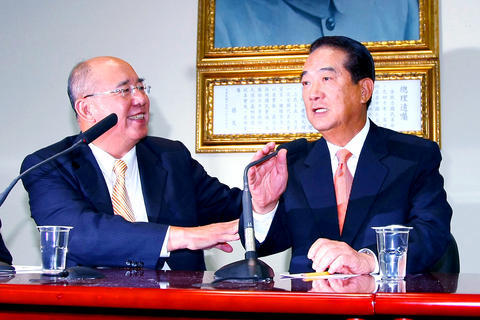Cooperation between the Chinese Nationalist Party (KMT) and the People First Party (PFP) increased yesterday as the chairmen of the two parties unveiled the four PFP legislator-at-large candidates nominated by the two parties and vowed to work closely together to win the elections next year.
The four PFP candidates -- Cheng Chin-ling (
"To achieve victory in the legislative and presidential elections, the KMT and the PFP must unite and closely cooperate. I have asked the candidates to join the KMT for complete KMT-PFP integration during the elections," PFP Chairman James Soong (宋楚瑜) said yesterday at KMT headquarters.

PHOTO: CNA
Joining Soong in announcing KMT-PFP cooperation during the legislative election, KMT Chairman Wu Poh-hsiung (吳伯雄) said the two parties had discussed cooperation for six months, but declined to comment on any final merger of the two parties.
"We won't talk about a merger now and the KMT will not meddle in the operations of the PFP's legislative caucus during this session," Wu said.
In addition to the four legislator-at-large candidates, six legislative candidates were nominated via the KMT-PFP alliance.
Ko Shu-ming (柯淑敏), Lee Hung-chun (李鴻鈞), Wu Chin-chih (吳清池), Chung Shao-Ho (鍾紹和), Fu Kun-chi (傅崑萁) and Daniel Hwang (黃義交) will join the KMT and register under the party, Soong said.
While he encouraged KMT-PFP cooperation for the elections, Soong nevertheless criticized the KMT for "deceiving voters" with its UN referendum bid and its recent removal of the "1992 consensus" from its mission statement.
"The Democratic Progressive Party [DPP] is fooling people with its UN referendum bid. [But] the KMT's bid to return to the UN under the name `Republic of China' [ROC] is also impossible. Isn't that deceptive as well?" Soong said.
Soong also expressed his disappointment with the KMT and its presidential candidate, Ma Ying-jeou (
"The PFP maintains that the ROC is the only option. Taiwanese independence is not an option for us. The PFP will not change its beliefs or alter its course for electoral purposes," he said.
During a visit to Europe last year, Ma said independence remained an option for Taiwan and has increasingly relied on pro-localization rhetoric to attract voters.
Soong denied he was targeting Ma with his remarks, but continued to called on the KMT not to forget its history and to stick to its political beliefs.
In response to Soong's criticism, Wu said the "1992 consensus" continued to be key a cross-strait policy in the party's Charter.
"But the KMT has to continue pushing the UN referendum bid, as it reflects the nation's difficult position in the international community," Wu said.
While the two chairmen declined to discuss the KMT-PFP merger, many expect the two parties will start preparations for a final merger after the new legislative session begins in February.
Asked for comment, PFP Legislator Shen Chin-hwei (
Shen said that even without KMT and PFP support she remained determined to run in the legislative election in the second district of Taichung City.
If Shen stands, she will be up against KMT Legislator Lu Shiow-yen (
In response, Marr said she had been included in the lineup because of her efforts to push for eco-friendly technology.
Approached by reporters, PFP Legislator Liu Wen-hsiung (
Additional reporting by Flora Wang

Chinese Nationalist Party (KMT) Chairman Eric Chu (朱立倫), spokeswoman Yang Chih-yu (楊智伃) and Legislator Hsieh Lung-chieh (謝龍介) would be summoned by police for questioning for leading an illegal assembly on Thursday evening last week, Minister of the Interior Liu Shyh-fang (劉世芳) said today. The three KMT officials led an assembly outside the Taipei City Prosecutors’ Office, a restricted area where public assembly is not allowed, protesting the questioning of several KMT staff and searches of KMT headquarters and offices in a recall petition forgery case. Chu, Yang and Hsieh are all suspected of contravening the Assembly and Parade Act (集會遊行法) by holding

PRAISE: Japanese visitor Takashi Kubota said the Taiwanese temple architecture images showcased in the AI Art Gallery were the most impressive displays he saw Taiwan does not have an official pavilion at the World Expo in Osaka, Japan, because of its diplomatic predicament, but the government-backed Tech World pavilion is drawing interest with its unique recreations of works by Taiwanese artists. The pavilion features an artificial intelligence (AI)-based art gallery showcasing works of famous Taiwanese artists from the Japanese colonial period using innovative technologies. Among its main simulated displays are Eastern gouache paintings by Chen Chin (陳進), Lin Yu-shan (林玉山) and Kuo Hsueh-hu (郭雪湖), who were the three young Taiwanese painters selected for the East Asian Painting exhibition in 1927. Gouache is a water-based

Taiwan would welcome the return of Honduras as a diplomatic ally if its next president decides to make such a move, Minister of Foreign Affairs Lin Chia-lung (林佳龍) said yesterday. “Of course, we would welcome Honduras if they want to restore diplomatic ties with Taiwan after their elections,” Lin said at a meeting of the legislature’s Foreign Affairs and National Defense Committee, when asked to comment on statements made by two of the three Honduran presidential candidates during the presidential campaign in the Central American country. Taiwan is paying close attention to the region as a whole in the wake of a

OFF-TARGET: More than 30,000 participants were expected to take part in the Games next month, but only 6,550 foreign and 19,400 Taiwanese athletes have registered Taipei city councilors yesterday blasted the organizers of next month’s World Masters Games over sudden timetable and venue changes, which they said have caused thousands of participants to back out of the international sporting event, among other organizational issues. They also cited visa delays and political interference by China as reasons many foreign athletes are requesting refunds for the event, to be held from May 17 to 30. Jointly organized by the Taipei and New Taipei City governments, the games have been rocked by numerous controversies since preparations began in 2020. Taipei City Councilor Lin Yen-feng (林延鳳) said yesterday that new measures by